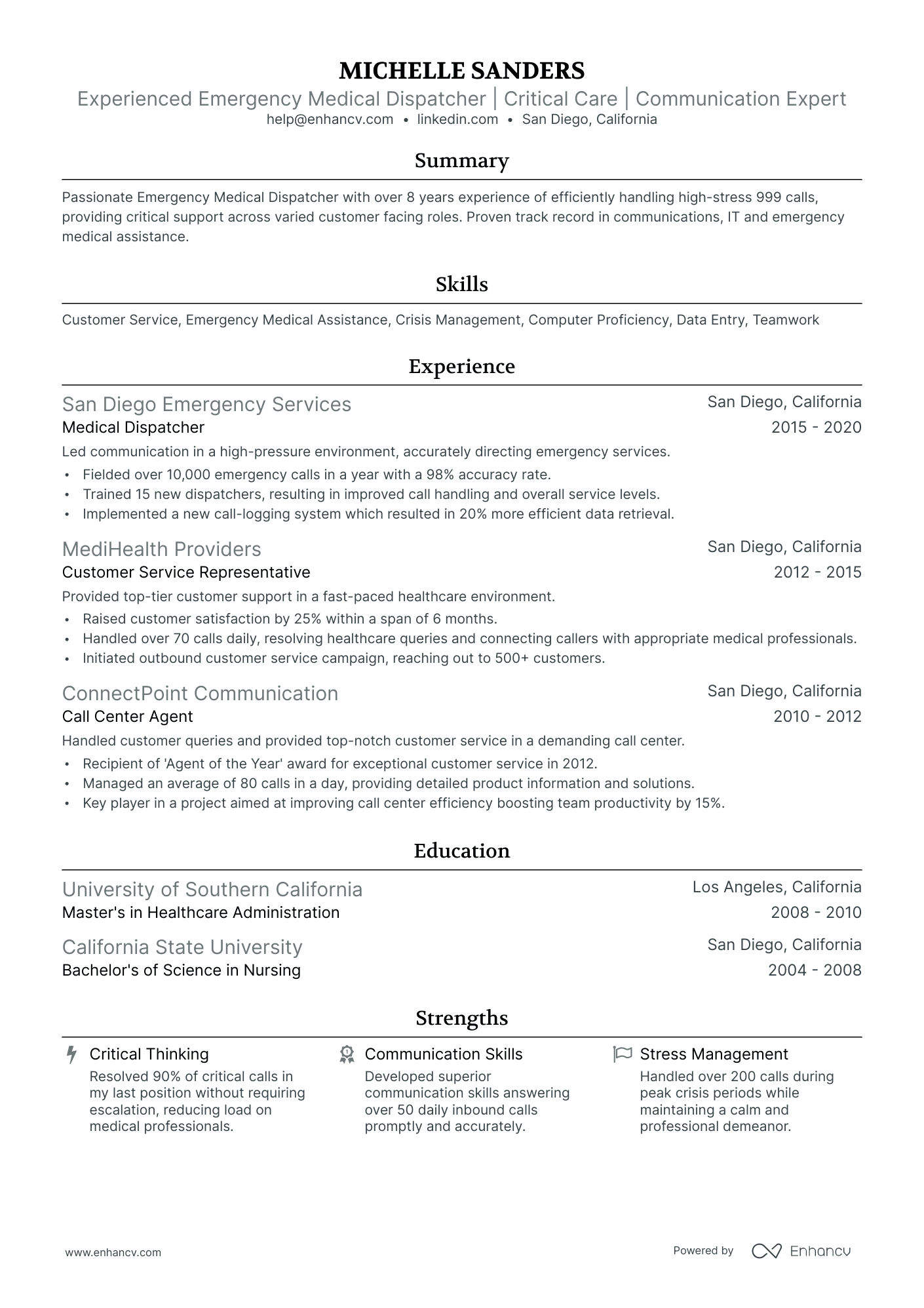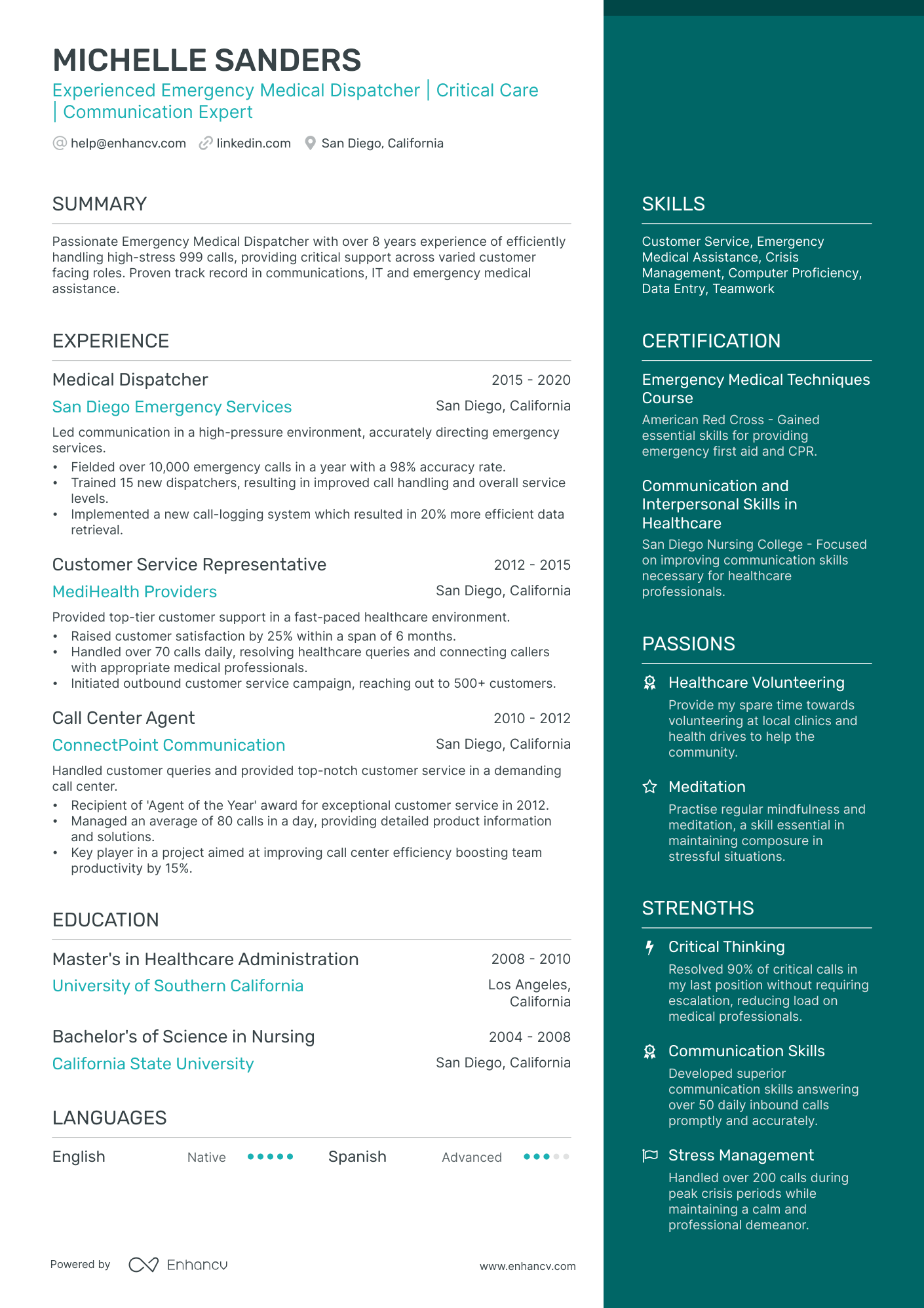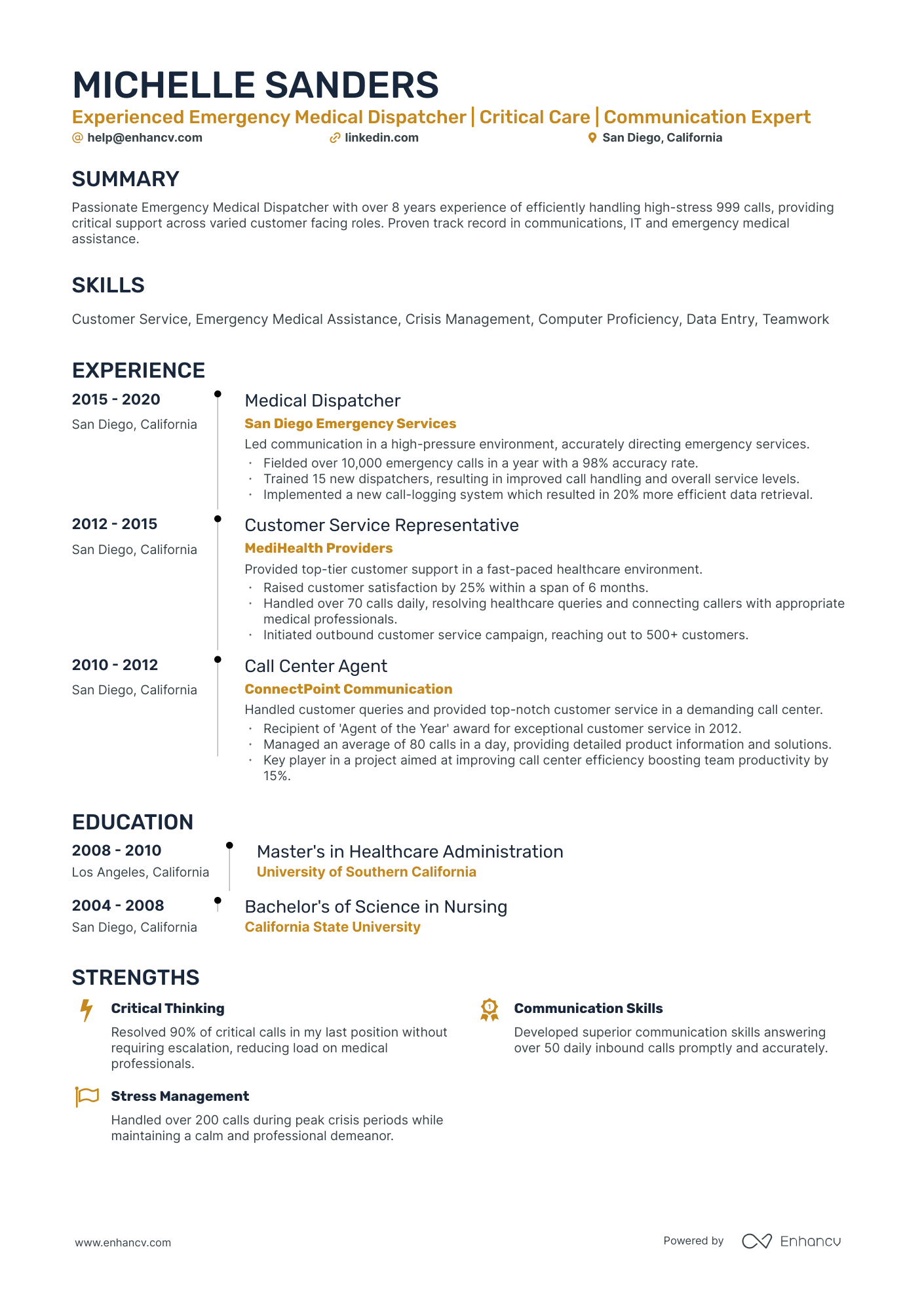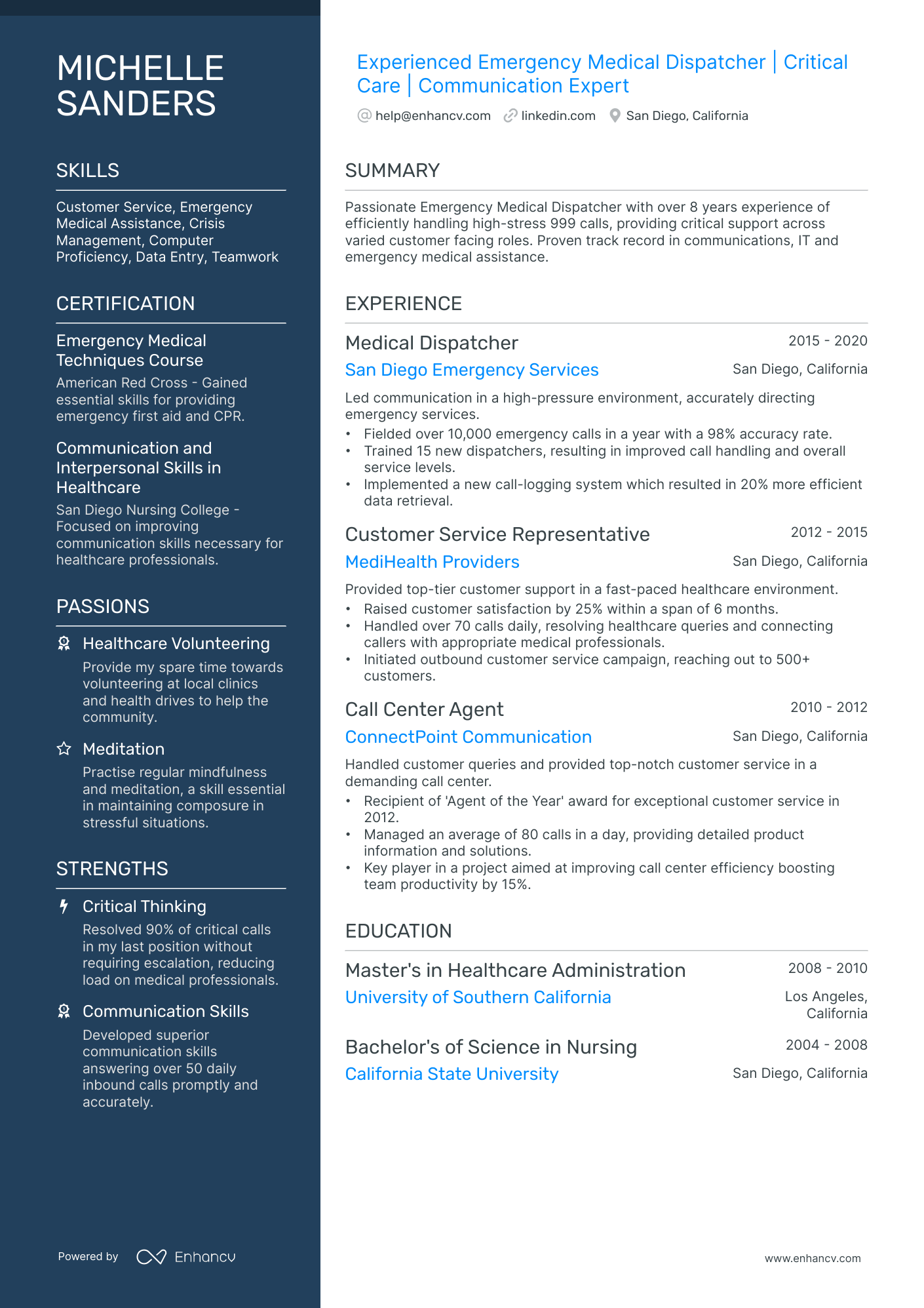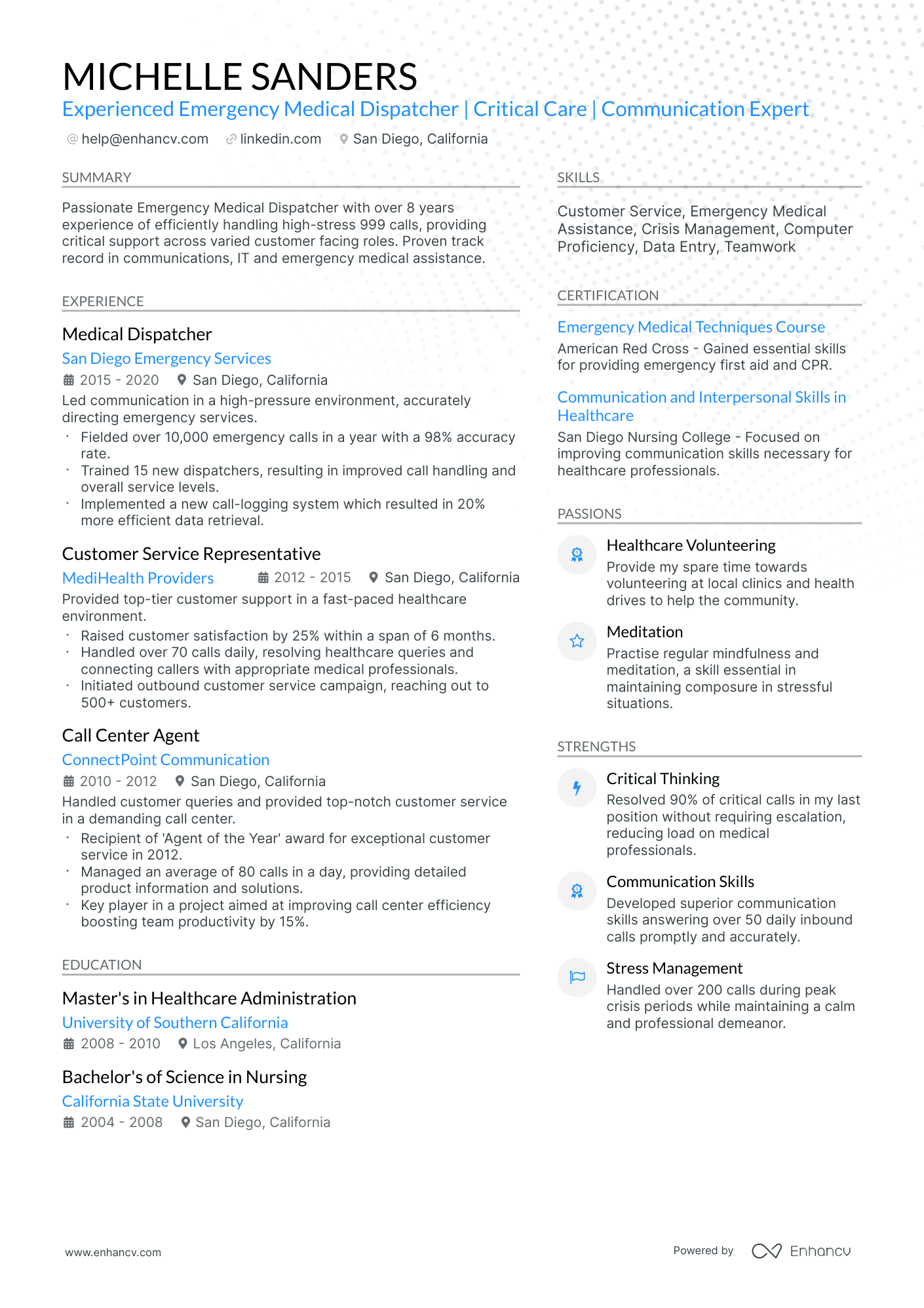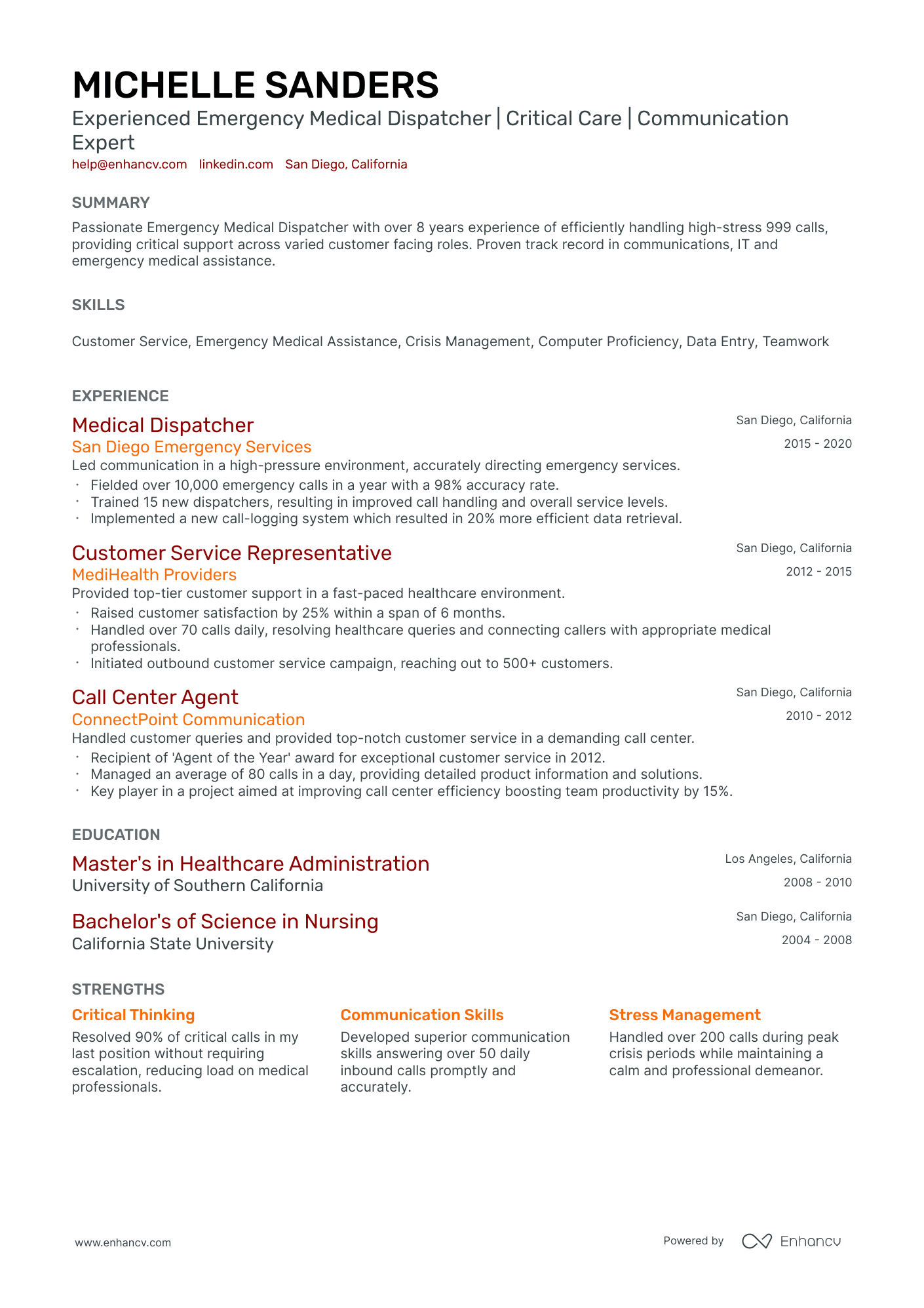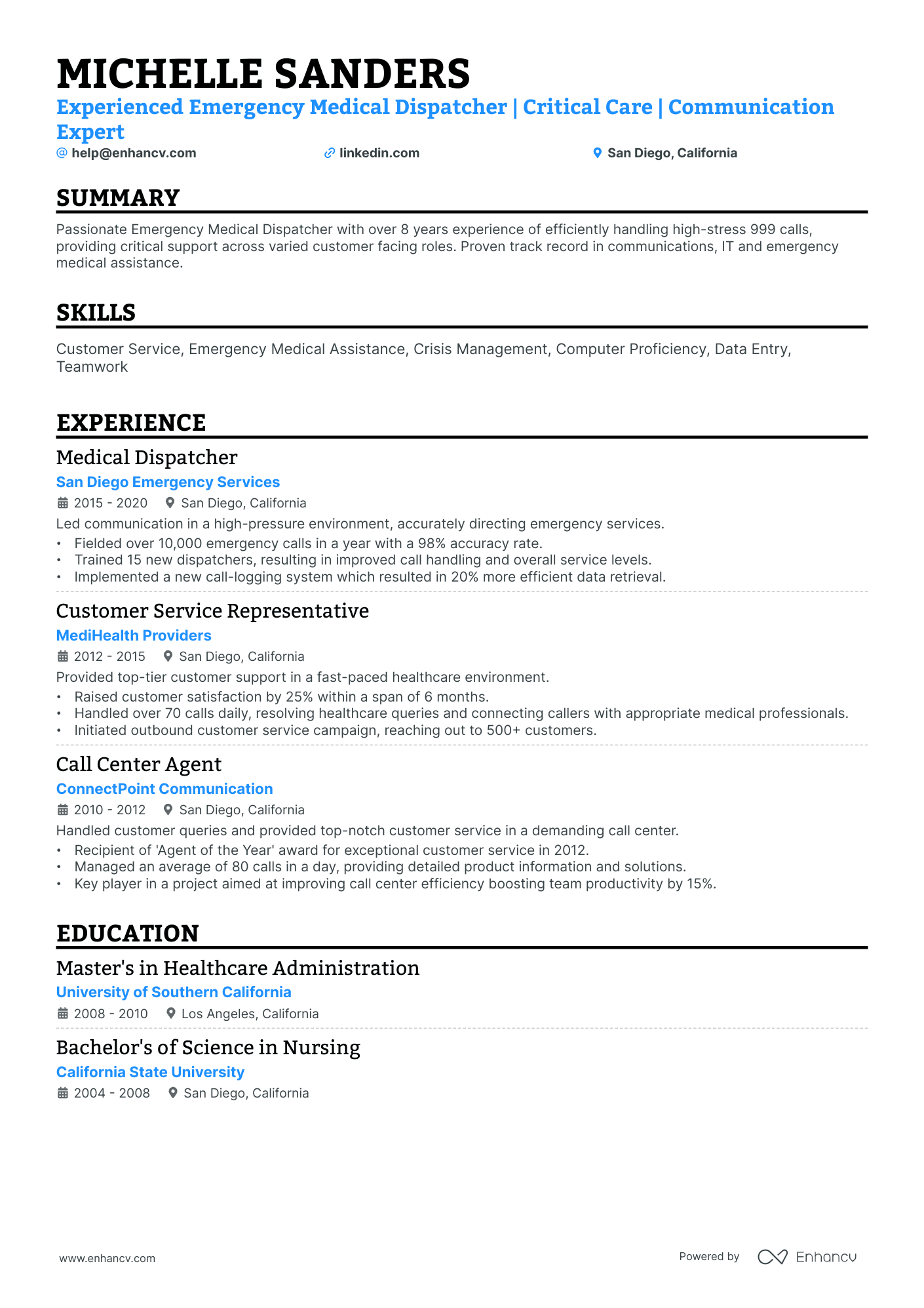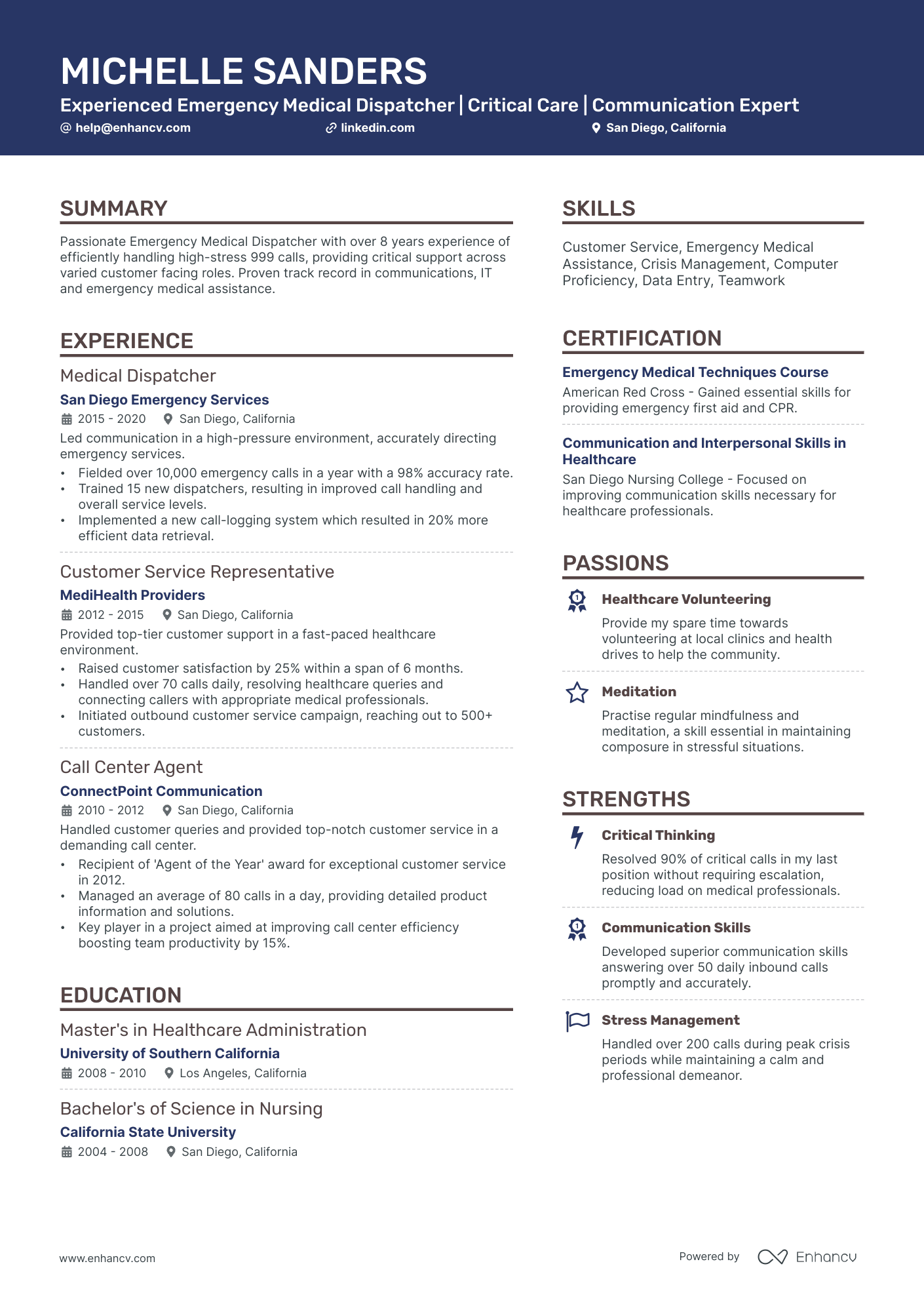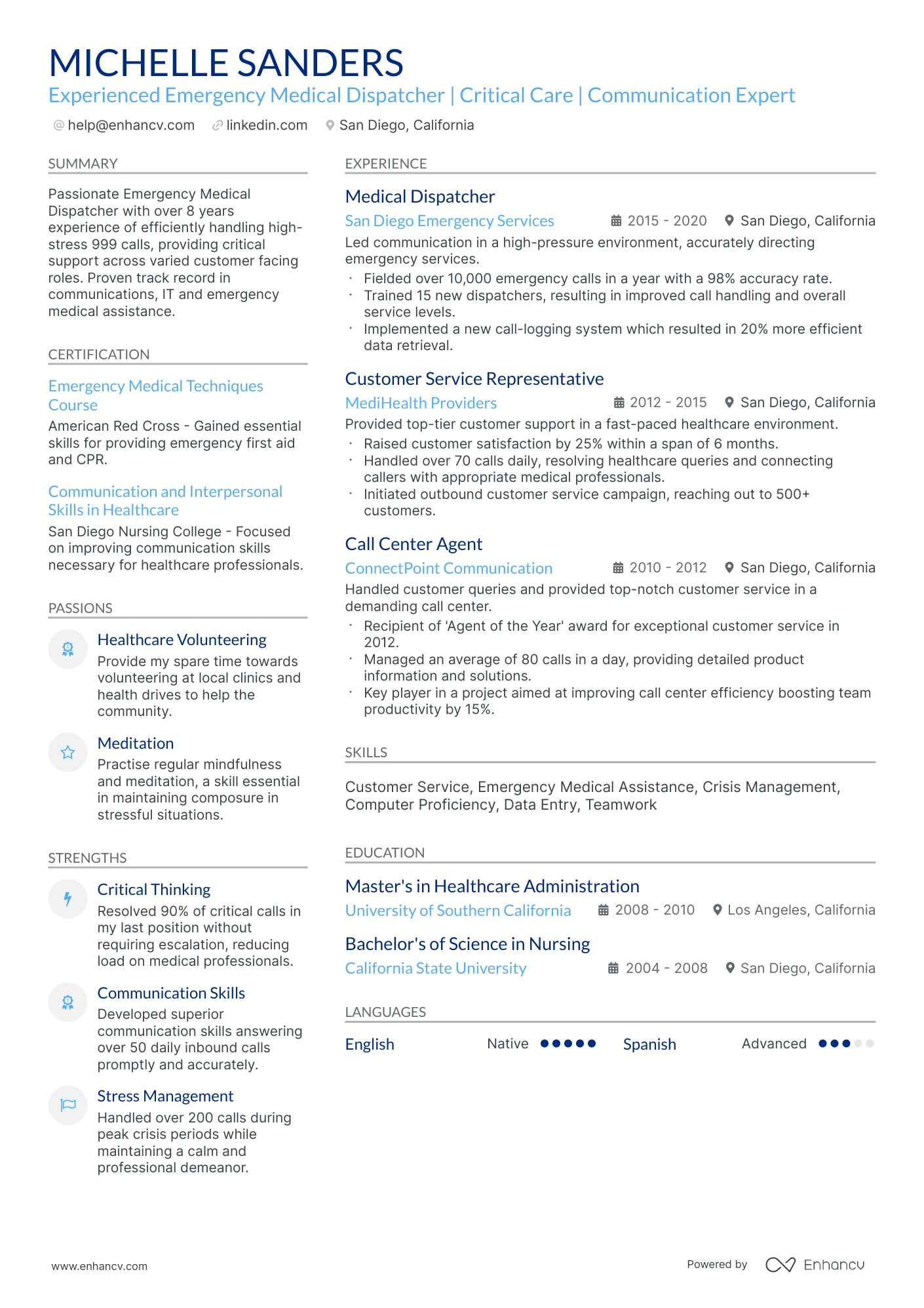Emergency dispatchers may struggle to effectively quantify and showcase their critical role in handling crisis situations on their resumes. Our guide can help by providing actionable strategies for articulating these complex experiences in a concise manner, offering examples of performance metrics, and suggesting powerful keywords that capture their essential skills and accomplishments.
Dive into this guide to uncover:
- Top-tier emergency dispatcher resume samples that have successfully landed candidates in leading companies.
- Strategies to direct recruiters' focus towards your standout experiences, notable achievements, and pivotal skills.
- Guidance on crafting resume sections that align closely with the vast majority of job specifications.
- Insights on harmonizing your emergency dispatcher technical prowess with your distinct personality, setting you apart from the competition.
Recommended reads:
Formatting the layout of your emergency dispatcher resume: design, length, and more
When it comes to the format of your emergency dispatcher resume , you've plenty of opportunities to get creative. But, as a general rule of thumb, there are four simple steps you could integrate into your resume layout.
- If you have plenty of experience, you'd like to showcase, invest in the reverse-chronological resume format. This format focuses on your latest experience items and skills you've learned during your relevant (and recent) jobs.
- Don't go over the two-page limit, when creating your professional emergency dispatcher resume. Curate within it mainly experience and skills that are relevant to the job.
- Make sure your emergency dispatcher resume header includes all of your valid contact information. You could also opt to display your professional portfolio or LinkedIn profile.
- Submit or send out your emergency dispatcher resume as a PDF, so you won't lose its layout and design.
The layout of a resume can differ by region – Canadian resumes may use a distinct format.
Upload your resume
Drop your resume here or choose a file. PDF & DOCX only. Max 2MB file size.
Pro tip
Make sure your resume is ATS compliant and catches the recruiters' attention by tailoring your experience to the specific job requirements. Quantify and highlight why you're the best candidate for the role on the first page of your resume.
Don't forget to include these six sections on your emergency dispatcher resume:
- A header for your contact details and a summary that highlight your alignment with the emergency dispatcher job you're applying for
- An experience section that explains how you apply your technical and personal skills to deliver successful results
- A skills section that further highlights how your profile matches the job requirements
- An education section that provides your academic background
- An achievements' section that mentions any career highlights that may be impressive, or that you might have missed so far in other resume sections
What recruiters want to see on your resume:
- Relevant Experience: Prior experience in dispatch, crisis management, or similar roles demonstrating familiarity with the demands of the job.
- Communication Skills: Ability to effectively listen, understand, and relay critical information precisely and quickly.
- Problem-Solving Abilities: Capacity to think critically, assess situations rapidly, and make informed decisions under pressure.
- Technical Proficiency: Knowledge of dispatch software, telecommunication systems, and GPS/routing technology.
- Stress Management: Evidence of handling high-stress situations professionally and maintaining composure during emergencies.
Recommended reads:
Detailing your relevant experience on your emergency dispatcher resume
Showcase your credibility in the resume experience section. For an effective emergency dispatcher resume:
- Highlight measurable achievements.
- Scan the job advert for keywords and integrate them throughout your experience section.
- Emphasize your technical proficiencies and how you've applied them in various roles.
- Keep it simple: mention your responsibility, relevant skills, and the outcomes.
- Use this section to convey your unique value, soft skills, feedback received, and the type of company culture you thrive in.
Top professionals ensure their experience section offers a captivating look at their expertise. Check out our sample emergency dispatcher resumes for guidance.
- Managed emergency calls for a busy metropolitan area, ensuring accurate and timely dispatch of emergency services.
- Coordinated with law enforcement agencies and fire departments to provide critical information during high-stress situations.
- Utilized computer-aided dispatch (CAD) systems to prioritize and assign emergency resources effectively.
- Trained new dispatchers on protocols and procedures, resulting in improved response times and customer satisfaction.
- Developed and maintained detailed logs of all emergency calls and responses for future reference and analysis.
- Responded to emergency calls, gathering essential details to determine appropriate response and dispatching necessary resources promptly.
- Collaborated with medical personnel to provide pre-arrival instructions to callers, assisting in life-saving measures.
- Operated two-way radio systems, maintaining clear and concise communication with field units and other emergency services.
- Assisted in the implementation of a new computer-aided dispatch (CAD) system, streamlining operations and improving efficiency.
- Participated in regular training exercises to enhance emergency response skills and stay up-to-date with evolving protocols.
- Received emergency calls from the public, accurately assessing the situation and dispatching appropriate emergency personnel.
- Maintained constant communication with field units, providing real-time updates and assistance as needed.
- Coordinated with neighboring counties to provide mutual aid during large-scale emergencies, ensuring efficient resource allocation.
- Implemented a new incident tracking system, resulting in improved documentation and information sharing among emergency response teams.
- Assisted in the development of standard operating procedures (SOPs) for emergency dispatch, enhancing overall operational effectiveness.
- Managed high-volume emergency call center, overseeing a team of dispatchers and ensuring smooth operations 24/7.
- Implemented a geolocation software system, enabling faster identification of caller locations and expediting emergency response times.
- Collaborated with emergency medical services to develop a triage protocol, maximizing the efficiency of resource allocation during mass casualty incidents.
- Led cross-departmental training sessions on crisis communications, improving interagency coordination during complex emergency situations.
- Utilized data analytics tools to analyze call patterns and identify areas for process improvement, resulting in a 15% reduction in average response time.
- Handled emergency calls for a diverse urban area, demonstrating calmness and empathy while gathering critical information from distressed callers.
- Coordinated helicopter medevac services, ensuring prompt transport of critically injured patients to specialized medical facilities.
- Assisted in the implementation of a new text-to-911 system, expanding accessibility for individuals with speech or hearing impairments.
- Collaborated with law enforcement agencies to provide real-time intelligence during ongoing incidents, facilitating informed decision-making.
- Received commendation for exceptional performance during a major natural disaster, effectively managing high call volumes and prioritizing response efforts.
- Supervised a team of emergency dispatchers, ensuring adherence to established protocols and maintaining a high level of professionalism.
- Developed and implemented a quality assurance program, conducting regular reviews of recorded calls to identify areas for improvement.
- Collaborated with IT department to upgrade computer-aided dispatch (CAD) software, enhancing system functionality and data accuracy.
- Provided on-the-job training and mentoring to new dispatchers, fostering a cohesive and efficient work environment.
- Coordinated with regional emergency management agencies to develop contingency plans for large-scale events, ensuring effective response and crowd control measures.
- Managed the integration of new technology systems into the emergency dispatch center, increasing operational efficiency and reducing response times.
- Coordinated with multiple agencies during multi-jurisdictional incidents, facilitating seamless communication and resource sharing.
- Developed and implemented a comprehensive training program for emergency call takers, improving their ability to gather critical information quickly.
- Led the transition to a cloud-based computer-aided dispatch (CAD) system, resulting in enhanced data accessibility and system reliability.
- Received recognition for outstanding performance during a hostage situation, effectively coordinating law enforcement response and ensuring a safe resolution.
- Provided emergency medical dispatch (EMD) services, guiding callers through life-saving procedures such as CPR and childbirth delivery.
- Collaborated with healthcare professionals to develop and update emergency medical protocols, ensuring accurate and consistent pre-arrival instructions.
- Assisted in the implementation of a new digital radio system, improving communication clarity and reducing response time delays.
- Coordinated with neighboring counties during major incidents, assisting with resource allocation and mutual aid requests.
- Received commendation for exceptional teamwork and professionalism during a complex multi-agency response to a large-scale industrial fire.
- Managed a team of emergency dispatchers, providing guidance and support in handling high-stress emergency situations.
- Implemented a real-time incident mapping system, allowing for better visualization of emergency incidents and facilitating efficient resource allocation.
- Collaborated with public safety agencies to develop and conduct active shooter training exercises, enhancing preparedness and response capabilities.
- Led the adoption of Next Generation 911 (NG911) technology, enabling the receipt of multimedia emergency communications for improved situational awareness.
- Successfully resolved a critical system outage during a major storm, ensuring uninterrupted emergency services and minimizing impact on the community.
- Responded to emergency calls during high-demand periods, managing multiple incidents simultaneously and allocating resources based on priority.
- Coordinated with air ambulance services to facilitate rapid medical evacuations from remote areas, ensuring timely access to specialized care.
- Developed and delivered training programs on stress management and resilience for dispatchers, promoting mental well-being and reducing burnout rates.
- Implemented a mobile app for field units to provide real-time incident updates, improving situational awareness and coordination.
- Received commendation for outstanding performance and dedication during a prolonged natural disaster response, playing a key role in saving lives and minimizing property damage.
The following content includes information from "O*NET OnLine" by the U.S. Department of Labor, Employment and Training Administration (USDOL/ETA). Used under the CC BY 4.0 license. The data represents the top responsibilities present on the task lists for emergency dispatcher professionals.
Top Responsibilities for Emergency Dispatcher:
- Provide emergency medical instructions to callers.
- Question callers to determine their locations and the nature of their problems to determine type of response needed.
- Determine response requirements and relative priorities of situations, and dispatch units in accordance with established procedures.
- Receive incoming telephone or alarm system calls regarding emergency and non-emergency police and fire service, emergency ambulance service, information, and after-hours calls for departments within a city.
- Relay information and messages to and from emergency sites, to law enforcement agencies, and to all other individuals or groups requiring notification.
- Record details of calls, dispatches, and messages.
- Monitor various radio frequencies, such as those used by public works departments, school security, and civil defense, to stay apprised of developing situations.
- Read and effectively interpret small-scale maps and information from a computer screen to determine locations and provide directions.
- Maintain access to, and security of, highly sensitive materials.
- Enter, update, and retrieve information from teletype networks and computerized data systems regarding such things as wanted persons, stolen property, vehicle registration, and stolen vehicles.
Quantifying impact on your resume
<ul>
Tips for emergency dispatcher newcomers launching their careers
Lacking extensive experience for that emergency dispatcher role? No worries.
Sometimes, hiring managers go for the unexpected candidate when they see potential.
Here's how to convince them you're the right fit:
- Opt for the functional skill-based or hybrid formats to highlight your unique professional value.
- Always tailor your emergency dispatcher resume to emphasize the most critical requirements, usually listed at the top of the job ad.
- Compensate for limited experience with other relevant sections like achievements, projects, and research.
- In your emergency dispatcher resume objective, pinpoint both your achievements and how you envision your role in the position.
Pro tip
Use the SOAR (Situation - Action - Results) method for each of your emergency dispatcher experience bullets. Reflect on specific challenges you've addressed, the actions you took, and the outcomes. This approach also preps you for potential interview questions.
Essential emergency dispatcher resume skills
When recruiters review emergency dispatcher resumes, they're looking for a mix of technical know-how and personal attributes.
Technical skills demonstrate your proficiency in specific tools or tasks. They indicate if you're ready to jump into the role or if you'll need extensive training.
On the other hand, soft skills reflect your interpersonal abilities. They show how you'll fit into a team or company culture.
To effectively present these skills on your resume:
- Design a skills section that highlights both your technical and interpersonal strengths.
- Provide examples where you've applied these skills, such as projects or tasks.
- For soft skills, describe situations where they've been crucial to your success.
- Use metrics, like improved efficiency or positive feedback, to validate your skills.
For inspiration, explore the preferred skills of leading emergency dispatcher professionals.
Top skills for your emergency dispatcher resume:
Computer-Aided Dispatch (CAD) software
Radio communication systems
Geographic Information Systems (GIS)
Emergency response protocols
Telecommunication systems
Call handling software
Mapping and routing software
Data entry and database management
Voice over Internet Protocol (VoIP)
First aid and CPR knowledge
Effective communication
Calm under pressure
Problem-solving
Multitasking
Empathy and compassion
Attention to detail
Time management
Team collaboration
Critical thinking
Adaptability
Next, you will find information on the top technologies for emergency dispatcher professonals from "O*NET OnLine" by the U.S. Department of Labor, Employment and Training Administration (USDOL/ETA). Used under the CC BY 4.0 license.
Top technologies for Emergency Dispatcher’s resume:
- Microsoft Access
- National Crime Information Center (NCIC) database
- Microsoft PowerPoint
- Computer aided dispatch software
- Spillman Technologies Spillman Computer-Aided Dispatch
Pro tip
If the job emphasizes team or organizational culture, dedicate a section of your resume to underscore your strengths and achievements. Top-tier emergency dispatcher candidates also highlight their alignment with a company's values and culture.
how to properly list your resume's education and certifications
Don't underestimate the importance of your resume education section , as it oftentimes helps you further tailor your resume to the job ad.
When writing your education section:
- Include the most relevant degree you have with information about the institution and dates of start and completion;
- If you're in the process of obtaining your degree, include your expected graduation date;
- Consider leaving off degrees that aren't relevant to the job or industry;
- Add bullet points to show how you gained valuable experience relevant for the job in an academic environment.
When describing your resume certifications , always consider their relevancy to the role.
Use the same format to describe them as you will for your education. If you're wondering what are the best certificates for emergency dispatcher roles, check out the list below.
Best certifications to list on your resume
Pro tip
If you're in the process of obtaining a certification listed in the job requirements but haven't completed it yet, be transparent. Mention your ongoing training and the expected completion date. Honesty is always the best policy on a resume.
Recommended reads:
Summary or objective: maximizing the impact of the top third of your resume
The top third of your emergency dispatcher resume is crucial. It's often the first thing recruiters see and can set the tone for the rest of your application.
Whether you choose a resume summary or a resume objective, make it count. The former is great for showcasing career highlights, while the latter balances your achievements with your future aspirations.
Both should be tailored to the role, as there's no universal approach to crafting the perfect emergency dispatcher summary or objective. Use the examples below as a starting point.
Resume summary and objective examples for a emergency dispatcher resume
- Seasoned emergency dispatcher boasting a robust background in law enforcement with over 10 years of experience. Proven history in efficiently coordinating dispatch of emergency services while maintaining composure under pressure. Renowned for implementing technological advancements that increased response times by 15%.
- As a dedicated paramedic with seven years of field experience and a deep understanding of emergency medical procedures, transitioning to an emergency dispatcher position promises seamless integration. Expertise in critical incident management coupled with superior communication skills and quick decision-making ability.
- With a decade-long career as a customer service professional in high-stress environments, seeking to leverage my exceptional problem-solving skills and quick-thinking abilities into an emergency dispatcher role. Notable experiences include managing diverse situations and ensuring timely service delivery.
- Former Police Officer turned emergency dispatcher, offering five years of experience in crisis management. Known for remaining composed during high stress situations and making swift decisions that prioritize public safety. Gained commendation for resolving a city-wide emergency with minimal casualties.
- A highly focused individual looking to commence a career as an emergency dispatcher, equipped with a degree in Emergency Management and comprehensive knowledge of emergency response protocols. Aspires to ensure effective communication and coordination during crisis scenarios to facilitate quick resolution and minimize harm.
- An enthusiastic graduate ready to start a career in emergency dispatching, bringing excellent communication skills, proficiency in using dispatch equipment and extensive training in CPR and first aid. Aims to aid in creating a safer community by facilitating effective dispatch of emergency services.
Additional sections to elevate your emergency dispatcher resume
Recruiters often seek candidates who offer more than just the basics.
To stand out, consider adding:
- Interests: Share hobbies or activities that reveal your personality and transferable skills.
- Projects: Highlight innovative work that showcases your expertise.
- Languages: If communication is vital for the role, showcase your linguistic abilities.
- Awards: Feature significant recognitions that underscore your expertise.
Key takeaways
- Your resume should be a curated narrative, highlighting your alignment with the role's requirements.
- Strategically position your skills, balancing both technical and interpersonal strengths.
- Be selective in detailing experiences, focusing on relevance and impact.
- Utilize the summary or objective to offer a snapshot of your professional essence.
- Across all sections, prioritize authenticity and clarity, ensuring your resume resonates with the emergency dispatcher role you're eyeing.
